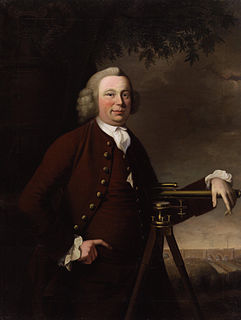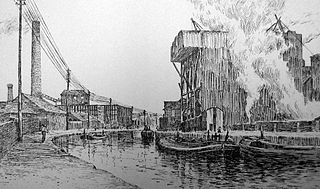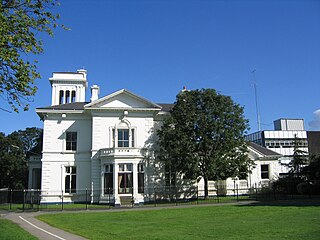
Dassel is a city in Meeker County, Minnesota, United States. The population was 1,469 at the 2010 census.

James Brindley was an English engineer. He was born in Tunstead, Derbyshire, and lived much of his life in Leek, Staffordshire, becoming one of the most notable engineers of the 18th century.

Thomas Rogers was a Leiden Separatist who traveled in 1620 with his eldest son Joseph as passengers on the historic voyage of the Pilgrim ship Mayflower.

Runcorn is a suburb on the south side of Brisbane, Queensland, and is about 19 kilometres (12 mi) from Brisbane’s central business district. Beenleigh and Warrigal Roads both run through the suburb, and are the primary links towards inner city Brisbane and beyond. Much of the suburb is bordered by Bulimba Creek, with the secondary source for the creek found within the suburb.

Hazlehurst & Sons was a company making soap and alkali in Runcorn, Cheshire, England in the 19th century and in the early years of the 20th century. The family was also largely responsible for the growth of Methodism in the town during the 19th century.

The Barony of Halton, in Cheshire, England, comprised a succession of 15 barons who held under the overlordship of the County Palatine of Chester ruled by the Earl of Chester. It was not therefore an English feudal barony which was under full royal jurisdiction, which is the usual sense of the term, but a separate class of barony within a palatinate. After the Norman conquest, William the Conqueror created three earldoms to protect his border with Wales, namely Shrewsbury, Hereford and Chester. Hugh Lupus was appointed Earl of Chester and he appointed his cousin, Nigel of Cotentin, as the first Baron of Halton. Halton was a village in Cheshire which is now part of the town of Runcorn. At its centre is a rocky prominence on which was built Halton Castle, the seat of the Barons of Halton; the castle is now a ruin.

Widnes is an industrial town in Cheshire, England, which in 2011 had a population of 61,464.
Thomas Hazlehurst was an English businessman who founded the soap and alkali manufacturing company of Hazlehurst & Sons in Runcorn, Cheshire. He was also a devoted Methodist and he played a large part in the civic matters of the town.

Thomas Hazlehurst was known nationally as "the Chapel Builder" and more locally as "the Prince of Methodism" or "the Prince of the Wesleyans". He was given these titles because of his generosity in paying wholly or largely for the building of some 12 chapels and three schools in the area of Runcorn, Widnes and the villages in north Cheshire. His father, also called Thomas, had founded a profitable soap and alkali manufacturing business, Hazlehurst & Sons, in Runcorn in 1816.
Thomas Alcock was a clergyman in the Church of England, a pluralist and an author.
Sir John Chesshyre was an English lawyer who rose to the position of king's first serjeant.
Neil Mathieson was a Scottish chemist and businessman.
Firth Brown Steels was initially formed in 1902, when Sheffield steelmakers John Brown & Company exchanged shares and came to a working agreement with neighbouring company Thomas Firth & Sons. In 1908 the two companies came together and established the Brown Firth Research Laboratories and it was here, in 1912, under the leadership of Harry Brearley they developed high chrome stainless steel. The companies continued under their own management until they formally merged in 1930 becoming Firth Brown Steels. The company is now part of Sheffield Forgemasters.

Charles Wigg was an English manufacturer of chemicals in Runcorn, Cheshire, England. After working as an export agent in Liverpool he joined with two managers of a Runcorn chemical factory to build what was initially known as the Old Quay Chemical Works, and later became Wigg Works. At first the works manufactured soap and alkali, but soon moved to extracting copper from pyrites ash, and later making bleaching powder and ferric oxide. During the later part of the 19th century it was one of the most successful businesses in Runcorn. Charles Wigg retired from the business shortly after it was taken over by the United Alkali Company and died eight years later. The site of the factory has been developed into a nature reserve called Wigg Island.

Holy Trinity Church is in Runcorn, Cheshire, England. It is an active Anglican parish church in the diocese of Chester, the archdeaconry of Chester and the deanery of Frodsham. Its benefice is combined with that of All Saints, Runcorn. It is recorded in the National Heritage List for England as a designated Grade II listed building.

Runcorn Town Hall is in Heath Road, Runcorn, Cheshire, England. It is recorded in the National Heritage List for England as a designated Grade II listed building. It was originally built as Halton Grange, a mansion for Thomas Johnson, a local industrialist. After passing through the ownership of two other industrialists, it was purchased in the 1930s by Runcorn Urban District Council and converted into their offices.
Duncan McKechnie was a British chemical manufacturer and metal extractor. He was trained as a soap boiler in Glasgow and later moved to become a foreman at a soap and alkali factory in Runcorn, Cheshire. In 1869 he entered into partnership with two colleagues to run a new chemical factory in the town, but soon left to found his own company in St Helens. This company specialised in extracting and refining metals. It was sold to the United Alkali Company in 1891. After McKechnie's retirement his descendants continued to run factories bearing the name McKechnie into the 20th century.













